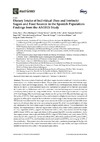Please use this identifier to cite or link to this item:
https://accedacris.ulpgc.es/jspui/handle/10553/23711
| Title: | Dietary intake of individual (free and intrinsic) sugars and food sources in the spanish population: findings from the ANIBES Study | Authors: | Ruiz, Emma Rodríguez, Paula Valero, Teresa Avila, José Manuel Aranceta Bartrina, Javier Gil, Ángel González-Gross, Marcela Ortega, Rosa M. Serra-Majem, Lluis Varela-Moreiras, Gregorio |
UNESCO Clasification: | 3206 Ciencias de la nutrición | Keywords: | Sugar intake Added sugar intake Free sugar intake Intrinsic sugar intake Dietary sources of sugars, et al |
Issue Date: | 2017 | Journal: | Nutrients | Abstract: | The consumption of total and individual sugars is controversial and little is known about consumption and dietary sources in Spain. The purpose was to examine free and intrinsic sugar intake and food and beverage sources. The ANIBES Study (Anthropometry, Intake and Energy Balance in Spain), a cross-sectional study of a representative sample of the Spanish population (9–75 years old; n = 2009) carried out in 2013, was used. Food and beverage records were obtained by a three-day dietary record by using a tablet device. The median total sugar intake was 71.5 g/day (17% Total Energy, TE), the intrinsic sugar intake was 38.3 g/day (9.6% TE), and the free sugar was 28.8 g/day (7.3% TE). Total sugar intake (free and intrinsic) was higher in men than in women for all age groups, although in terms of the contribution to total energy intake, the opposite was observed. Differences were observed for free sugar consumption dependent on age and marked differences (up to two-fold) were observed when considering the percent TE, which was much higher in children and adolescents. For the intrinsic sugar, however, a higher contribution to TE was observed in the elderly. The major sources of intrinsic sugars were fruits (31.8%), milks (19.6%), juices and nectars (11.1%), vegetables (9.89%), yogurt and fermented milk (7.18%), low-alcohol-content beverages (4,94%), bread (2.91%), and sugar soft drinks (2.24%), greater than 90% from diet contribution. As for free sugars, sources were sugar soft drinks (25.5%), sugar (17.8%), bakery and pastry items (15.2%), chocolates (11.4%), yogurt and fermented milk (6.44%), other dairy products (5.99%), jams (3.58%), juices and nectars (2.91%), and breakfast cereals and cereal bars (2.78%), summing up to 90% of the contribution. The present study demonstrates that only a moderate percentage of the Spanish population adhered to the present recommendations for total sugar intake, and urgent efforts are needed to improve diet quality in the youngest populations. | URI: | https://accedacris.ulpgc.es/handle/10553/23711 | ISSN: | 2072-6643 | DOI: | 10.3390/nu9030275 | Source: | Nutrients [ISSN 2072-6643], v. 9 (3), 275 | Rights: | by-nc-nd |
| Appears in Collections: | Artículos |
SCOPUSTM
Citations
57
checked on Jun 8, 2025
WEB OF SCIENCETM
Citations
56
checked on Feb 15, 2026
Page view(s) 5
60
checked on Jan 11, 2026
Download(s)
103
checked on Jan 11, 2026
Google ScholarTM
Check
Altmetric
Share
Export metadata
Items in accedaCRIS are protected by copyright, with all rights reserved, unless otherwise indicated.
